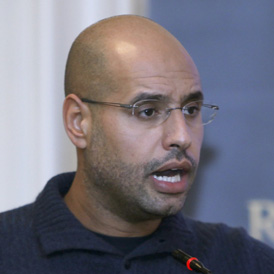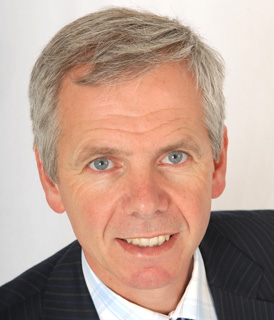Gaddafi’s billions ‘will never be found’
The man who tried to teach Colonel Gaddafi’s son, Saif, economics tells Channel 4 News the government’s moves to seize the dictator’s assets are little more than posturing.

The economist once charged with the hopeless task of educating Colonel Gaddafi’s “thick” son has accused the Government of being “deliberately disingenuous’” over its efforts to seize the dictator’s assets.
Tax evasion campaigner John Christensen has been watching the drama unfold in Libya with more interest than most – one of the key players is an ex-pupil of his.
Mr Christensen, a development economist and former economic adviser to the UK Government who now heads a campaign against offshore banking, added his twist to the story in his online blog.
He said: “Shortly after Mr Gaddafi started his studies at the LSE it became clear that he was struggling, not least with economics. The then Libyan ambassador to the UK discreetly requested that Saif be given extra tuition, and by various circuitous routes I was approached to tutor him.”
‘No academic ability’
Mr Christensen said he pulled out of the arrangement after a few months, without taking a penny, when he realised Saif had “absolutely no academic ability”. Not even the hinted reward of a top-of-the-range Mercedes could make him change his mind.
His pupil was “thick” and, ironically, was studying democracy and the role of civil society – “concepts that were entirely alien to him”.
Saif was awarded an LSE doctorate in 2008, though recent reports have claimed it was extensively plagiarised.
That, and the fact that the university accepted millions from the Gaddafi regime, has now prompted LSE chief Sir Howard Davies to fall on his sword.
Read FactCheck - Saif Gaddafi: Genius or fraud?
Earlier this week Saif appeared on Libyan state television telling protesters to clear the streets or face rivers of blood.
The appearance coincided with an announcement by the Chancellor, George Osborne, that Britain was to seize £1 bn of assets belonging to Colonel Gaddafi and his children.
A Treasury spokesman has pointed out that the asset freeze has been extended to 20 senior members of the regime, and said the Chancellor was determined that the regime’s financial assets will not be used against the Libyan people.
Emergency meetings of the Privy Council, seizures of shipments of cash bound for Libya, frozen bank accounts – all dramatic stuff, but a distraction from the real story, according to Mr Christensen.
In the years since his brush with Saif Gaddafi, the economist has built up the Tax Justice Network, a pressure group that lobbies for the clean-up of what is says is a complex international network of money-laundering and tax evasion that has mushroomed with the tacit approval of world governments including that of the UK.
Vows by world leaders to crack down on tax havens in the wake of the global financial crisis were no more than crocodile tears, according to Mr Christensen.

Blind eye
For decades, the argument goes, countries like Britain have deliberately turned a blind eye to the loopholes that let oligarchs, multinational corporations and criminals wash their dirty money using “secrecy jurisdictions” like the Channel Islands.
The twilight world of offshore banking seen as a vital way of getting foreign capital into the UK, and is a huge source of revenue for the financial services industry.
Much of the cash ends up in London but is untraceable thanks to use of anonymous trust funds, shell companies designed to shield the identities of the real owners and other well-worn tricks of the money-laundering trade.
So for all his tough talk, Mr Osborne will be well aware of the impossibility of ever really tracking down Gaddafi’s billions, according to Mr Christensen.
He told Channel 4 News: “The Gaddafis will have set up very elaborate offshore structures, in all probability involving companies owned by offshore trusts. The companies will then own other companies. You then have what is then called a ladder.
“They will have shifted the assets out of Libya through oil sales or something similar. Or Gaddafi and the family will have import licences for a lot of goods intended for consumption within Libya. They will be able to use these structures to overcharge on sales.
“Capital goods will be shipped to Libya – it could be cars, it could be trucks, it could be military hardware. Let’s say they purchase them in France. The invoice will go out to France to an offshore company somewhere like Cyprus. That company will reinvoice on into Libya. By massively overpricing the imports, they will be able to shift massive amounts of wealth.
“This is a process which has been used for decades, certainly since the 1970s. The family could use this technique for shifting massive amounts of capital into the offshore world – places like Monaco, Geneva and the Channel Islands. The weapon of choice as far as maintaining secrecy is concerned is the trust.”
But for a dictator facing increasing unrest with a shrinking circle of friends, where is the best place for the money to end up?
Mr Christensen said: “London is very often their main target. It is to do with the huge secrecy that London and its tax haven satellites can provide.
“For the Middle East elite, places like London and Geneva are regarded as the places where their assets are most secure and where they are personally protected. London is the oligarchs’ choice of residence.”
John Christensen has little time for the government’s claims to be taking a tough line on seizing Gaddafi’s assets.
“In my opinion they are being deliberately disingenuous. They are not naive about these things,” he said.
“From my own experience, working as an observer to the UN processes, to the OECD, and more recently the G20 processes and in the European Union, I can say that the UK Government actively blocks progress in this area.
“The UK government in particular tries to protect offshore.”
While the very nature of the secrecy that surrounds the world of offshore banking means it is impossible to say for certain what the Gaddafis have done with its loot, to economists like John Christensen there is very little doubt about the kind of methods they would have used.
“If they hadn’t done it they would have been remarkably badly advised.”
So will Libya’s elite now be quaking at the British Government’s efforts to seize their London assets?
“Not at all. Their advisors will be saying: ‘Good luck to you. You might be able to take one or two houses. The real wealth will be very well hidden.'”
A Treasury spokesman said: “The Libyan asset freeze has been extended to a further 20 senior members of the regime. The case for going further is being kept under continual review. The Chancellor is determined that the UK and international community does all that it can to ensure that financial assets cannot be used against the interests of the Libyan people.
“The UK Government has been at the forefront of international efforts to tackle tax evasion. Improving transparency and exchange of information between tax authorities is the key to this.
"Over the past year, we have seen unprecedented progress on tax information exchange. Over 500 Tax Information Exchange Agreements and Double Taxation Agreements have been negotiated to the international standard. This will mean that there are simply fewer places for evaders to hide their money. In addition, the Global Forum on Tax Transparency has been conducting a robust peer review process to ensure that countries are fully implementing their commitments."